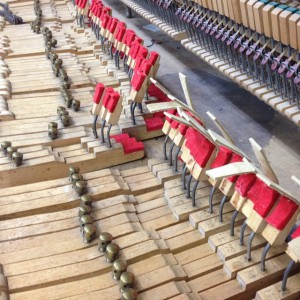How to Become a Piano Tuner
 Becoming a successful piano tuner takes years of practise. Tuning a stringed instrument like a guitar is simple compared to the intricate process involved in tuning every single string in a piano.
Becoming a successful piano tuner takes years of practise. Tuning a stringed instrument like a guitar is simple compared to the intricate process involved in tuning every single string in a piano.
More than this, every piano has its own musical personality, and the real skill of a piano tuner is to tune a piano so that its personality is not lost.
Can you play?
Piano tuners generally have a good command of the piano and can play reasonably well. You don’t need to be a concert pianist, but you’ll need enough experience to understand how different pianos sound. It helps if you know how to play different styles of music so you can bring out the best in a piece.
If you have a search online, you’ll probably find yourself a college course or private tuition that you can benefit from; the Pianoforte Tuners’ Association runs the best courses around.
If you can find an experienced piano tuner, you may ask them if they would be willing to take you on as an apprentice once you’re trained. Piano tuning is best learned from someone who has been performing the task for years, and it helps to form connections with local piano suppliers who may need your services in the future.
Join the Pianoforte Tuners’ Association
The Pianoforte Tuners’ Association has been established in the UK since 1913, and is recognised as the number one body for accredited, professional piano tuners to become a members of.
The PTA accepts applications for tuners who have:
- Been trained as a tuner, technician or pianomaker for at least three years, or
- Have completed a course in tuning or piano technicians’ studies at a recognised college (and have the certificate to prove it)
Everyone who applies also has to have earned a living as a tuner for at least two years.
You can bypass the above entry requirements if you’ve worked as a tuner, technician or piano maker for seven years or more, and are still working in the industry now.
As part of the entry process, you’ll need to pass a test. Depending on your skillset, this will either be a tuning and repair test, or a specialist test that’s related to your own technical skills.
The training may be lengthy and (at times) very technical, and you’ll need to have an in-depth knowledge of most brands and types of pianos (including uprights, grands, silent pianos and more). You also need to be trained to work hands-on with pianos in a very poor state of repair, as well as the ones that just need a basic tune-up, and you’ll need to spot technical faults as you work.
Finding Work
Once you have some experience under your belt, finding work is easier than you’d expect. While fewer homes have pianos, there are also fewer tuners to tune them, so tuners are in great demand. At Piano Workshop, we find that there are a shortage of tuners in the market, and new trainee piano tuners are sure of a bright future with a healthy stream of highly enjoyable work.

